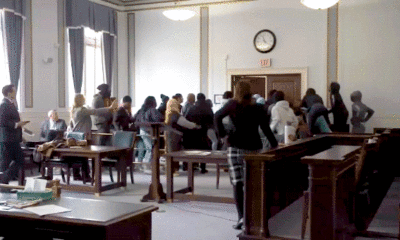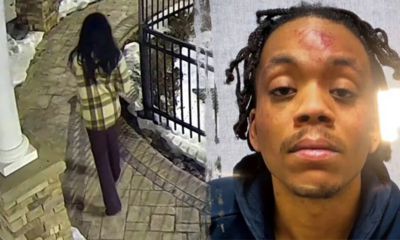SOUTH DAKOTA
State law could delay carbon pipeline
SIOUX FALLS — The company behind an $8.9 billion carbon-capture pipeline proposed for five Midwestern states said on March 12 it wants to indefinitely delay its plans after South Dakota passed a law limiting its ability to acquire land for the project.
But even as it filed a motion to suspend its pipeline permit application timeline with the South Dakota Public Utilities Commission, the Iowa-based Summit Carbon Solutions said it remains committed to the pipeline.
Summit attorney Brett Koenecke said the action was needed because the legislation approved by South Dakota lawmakers and quickly signed into law by the governor changed the company’s ability to survey the route, making its application timeline “unrealistic.”
The proposed 2,500-mile pipeline would carry carbon emissions from ethanol plants in Iowa, Minnesota, Nebraska, North Dakota and South Dakota to be stored underground permanently in North Dakota.
The project had approvals in Iowa, Minnesota and North Dakota. But in South Dakota, a new law banned the use of eminent domain — the government seizure of private property with compensation — specifically for carbon-capture projects.
Tad Hepner, vice president of strategy and innovation at the Renewable Fuels Association, said the move would put ethanol producers in the state at a competitive disadvantage to out-of-state plants connected to the pipeline.
North Dakota Gov. Kelly Armstrong said he doesn’t know how Summit will get its pipeline into North Dakota given South Dakota’s eminent domain ban.
Summit has already spent more than $1 billion on the project, Summit spokesperson Sabrina Zenor said. Despite the South Dakota suspension, “all options” are still on the table, the company said.
UTAH
Law requires app stores to verify ages
SALT LAKE CITY — Utah on March 5 became the first state to pass legislation requiring app stores to verify users’ ages and get parental consent for minors to download apps to their devices.
The bill has pitted Meta, which operates Facebook and Instagram, against app store giants Apple and Google over who should be responsible for verifying ages.
Meta and other social media companies support putting the onus on app stores to verify ages amid criticism that they don’t do enough to make their products safe for children — or verify that no kids under 13 use them.
The app stores say app developers are better equipped to handle age verification and other safety measures. Requiring app stores to confirm ages will make it so all users have to hand over sensitive identifying information, such as a driver’s license, passport, credit card or Social Security number, even if they don’t want to use an age-restricted app, Apple said.
The company gives parents the option to set age-appropriate parameters for app downloads. The Google Play Store does the same.
Kouri Marshall, a spokesperson for the Chamber of Progress, a tech policy group that lobbied Utah lawmakers to reject the bill, called the measure “a tremendous encroachment of individual privacy” that he said places a heavy burden on app stores to ensure online safety.
Republican Sen. Todd Weiler, the bill’s sponsor, argued that it’s easier to “target two app stores than it is to target 10,000 (app) developers.”
IDAHO
Bill makes firing squad chief execution method
BOISE — Death by firing squad could become Idaho’s primary method of execution under a bill passed by the legislature and set to take take effect next year if it is signed by Gov. Brad Little.
Firing-squad executions have been a back-up method in Idaho since 2023, available only if prison officials are unable to obtain lethal injection drugs.
Sen. Doug Ricks, the bill’s sponsor, said the legislation was spurred by Idaho’s botched attempt to execute Thomas Eugene Creech last year, when execution team members were unable to find a suitable vein for an IV line. He suggested shooting someone was more effective and humane than other execution methods. He speculated that the state could use a machine or “electronic triggering methods” that would eliminate the need for human volunteers to pull the triggers.

Four other states — Mississippi, Oklahoma, South Carolina and Utah — also allow the use of firing squads in certain circumstances, but the method has rarely been used in recent history.
Republican Sen. Daniel Foreman, a retired police officer and former Air Force veteran who served in combat, was the only Republican to debate against the bill. He said he has seen shooting deaths, and that they are “anything but humane.”
Democratic Sen. Melissa Wintrow agreed, calling firing squads “barbaric” and saying they would create bad optics for the state.
NEW MEXICO
‘Young Guns 3: Dead or Alive’ set to film
SANTA FE — It’s been almost 40 years since Emilio Estevez first drew his revolver as Billy the Kid in the iconic Western “Young Guns.”
The actor visited the New Mexico State Capitol on March 13 during Film and Media Day to announce that he’ll be coming back to where it all started to film the next installment in the franchise. He will direct “Young Guns 3: Dead or Alive” and will star again as the famous outlaw. The cast also includes original members Lou Diamond Phillips and Christian Slater.
Estevez said during a news conference that he’s heard jokes about whether the title should be “Old Guns.”
The first “Young Guns” premiered in 1988. Its success resulted in a sequel that followed two years later. Both were filmed in New Mexico.

Gov. Michelle Lujan Grisham highlighted “Young Guns” as one of the films that helped to establish the state as a premier filming destination, saying the next one will add to the legacy.
Estevez, 62, said some work already is happening on the film, but officials didn’t provide any details on when the cameras could start rolling. The plot also is under wraps, although Estevez and Phillips had hinted in interviews in recent years that it was very possible that the franchise would return to the big screen.
Written by Estevez and John Fusco, “Young Guns 3” will be produced by Morgan Creek.







































